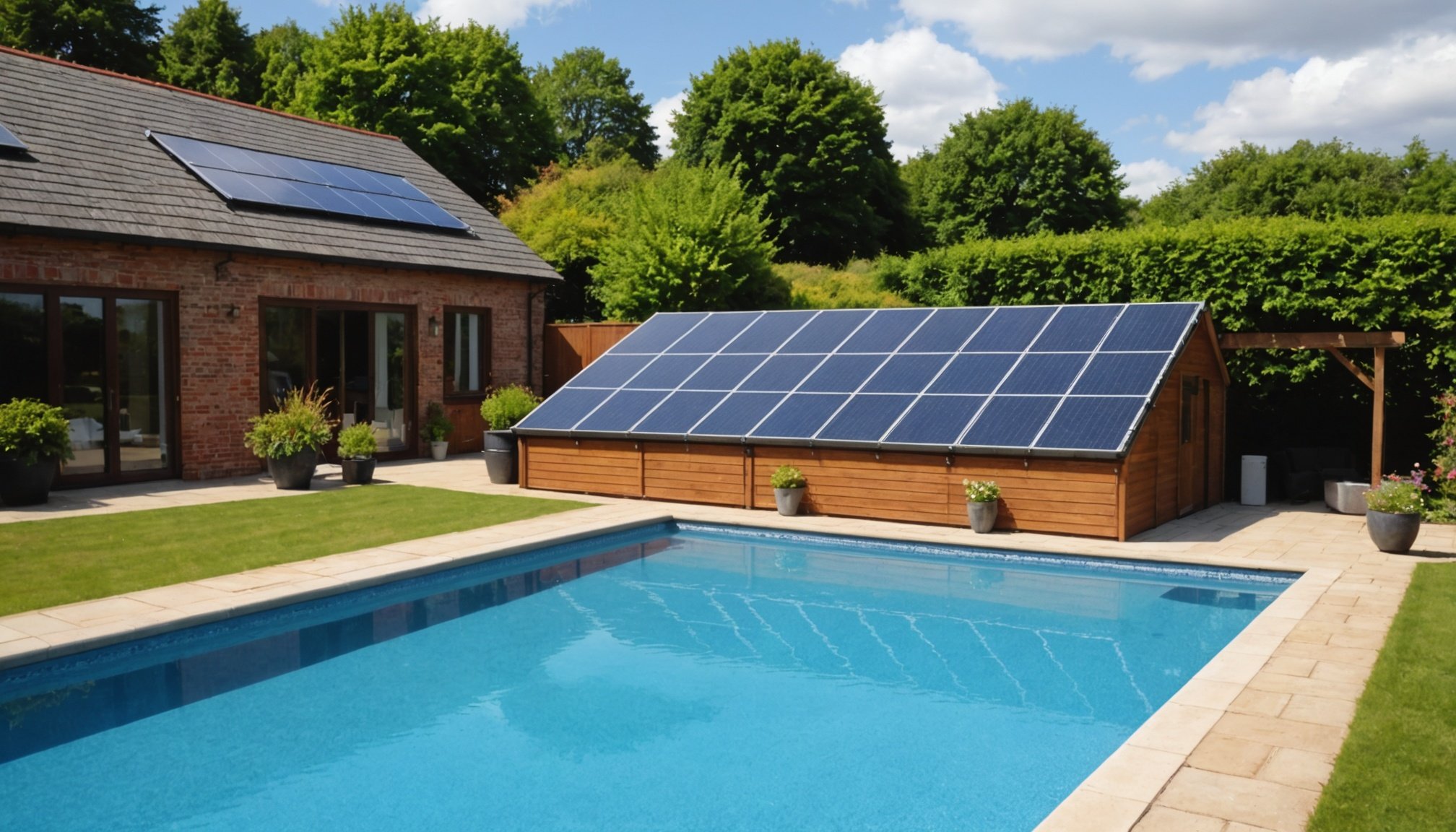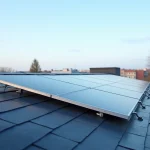Heating your pool can transform your leisure time, especially in the unpredictable UK climate. Solar panels present an eco-friendly, cost-effective solution for maintaining comfortable water temperatures year-round. By harnessing solar energy, you not only enhance your swimming experience but also contribute to sustainability. Imagine enjoying your pool longer without worrying about heating expenses. Discover how you can maximize enjoyment and minimize costs through the smart use of solar technology. Your ideal pool experience awaits!
Introduction to Solar Heating for Pools
Solar heating technology offers an environmentally friendly solution for pool heating systems. By harnessing the sun's energy, solar panels efficiently warm pool water, providing a sustainable and cost-effective method for UK pool owners. This approach not only reduces reliance on fossil fuels but also minimizes energy bills, making it an attractive option for those looking to enhance their pool experience.
In the same genre : How should you store pool chemicals safely in the UK?
In the UK, the popularity of solar pool heating is on the rise. This growing trend is attributed to the increasing awareness of environmental issues and the desire for sustainable living. Many UK pool owners are turning to solar heating as a viable alternative to traditional methods, which can be both costly and environmentally detrimental.
Benefits of Solar Heating
- Cost Savings: Solar heating reduces energy bills substantially over time.
- Environmental Impact: Utilizes renewable energy, reducing carbon footprint.
- Low Maintenance: Solar panels require minimal upkeep compared to conventional systems.
A notable quote from a satisfied user states, "Switching to solar heating has transformed our pool usage, making it more enjoyable and guilt-free."
Also to see : What are the most common pool maintenance mistakes made by UK homeowners?
As more UK pool owners embrace this technology, the shift towards solar pool heating reflects a broader commitment to sustainable practices. This movement not only benefits individual households but also contributes positively to the environment.
Understanding Solar Panel Systems
Exploring the intricacies of solar panel systems reveals their pivotal role in harnessing solar energy for pool heating. These systems primarily utilize photovoltaic panels, which are designed to convert sunlight into usable heat for warming pool water.
Types of Solar Panels
There are several types of solar panels suitable for pool heating, each with unique features. Flat plate collectors are common, offering durability and efficiency. Alternatively, evacuated tube collectors provide superior heat retention, especially in cooler climates. Choosing the right type depends on specific needs and environmental conditions.
Conversion Process
Solar energy is absorbed by the photovoltaic panels and then converted into heat through a series of processes. This involves the transformation of sunlight into thermal energy, which is then transferred to the pool water. This conversion is both efficient and environmentally friendly, making it a preferred choice for many pool owners.
Key Components
A typical solar pool heating system includes solar panels, a pump, and a heat exchanger. The pump circulates pool water through the panels, where it is heated before returning to the pool. This cycle ensures consistent water temperature, enhancing the swimming experience.
By understanding these elements, pool owners can make informed decisions about integrating solar energy into their heating systems.
Installation Process for Solar Pool Heating
Understanding the solar panel installation process is crucial for those considering pool heating installation. Whether opting for a professional service or a DIY installation, knowing the steps involved can empower pool owners to make informed decisions.
Step-by-Step Guide
To begin, assess your pool area to determine the optimal placement for solar panels. Panels should be positioned to maximize sun exposure. Next, gather essential tools such as a drill, wrench set, and mounting brackets. Install the mounting system securely, ensuring it can withstand environmental conditions.
DIY installation offers cost savings but requires technical proficiency. Conversely, professional installation guarantees expertise and efficiency, albeit at a higher cost. Consider your skill level and budget when deciding between these options.
Essential Tools and Materials
- Solar panels
- Mounting brackets
- Drill and wrench set
- Heat exchanger
- Pool pump
Professional vs. DIY Installation
Professional installation provides peace of mind with expert handling and warranty coverage. However, DIY installation can be rewarding for those with the necessary skills, offering a hands-on approach and potential cost reductions.
By understanding the installation process, pool owners can select the best approach for integrating solar energy into their pool heating systems, ensuring a sustainable and efficient setup.
Cost-Benefit Analysis of Solar Pool Heating
Exploring the financial implications of solar pool heating systems reveals a compelling case for investment. While the initial costs may seem substantial, the long-term savings on energy bills can be significant, offering a favorable return on investment.
Initial Costs of Solar Panel Systems
The initial costs for installing solar panel systems can vary depending on the size of the pool and the type of panels chosen. Typically, these costs include purchasing solar panels, installation fees, and any necessary modifications to existing systems. Despite the upfront expenditure, these systems are designed to last for many years, often with minimal maintenance.
Long-Term Savings on Energy Bills
Once installed, solar heating systems significantly reduce reliance on traditional energy sources, leading to dramatic savings on energy bills. Over time, these savings can offset the initial costs, making solar heating a cost-effective choice for pool owners.
Comparison with Traditional Pool Heating Methods
When compared to conventional methods, solar heating offers superior return on investment. Traditional systems often incur high ongoing costs due to fuel consumption and maintenance needs. In contrast, solar heating utilizes free, renewable energy, ensuring consistent savings.
- Initial investment: High
- Energy savings: Substantial
- Maintenance: Minimal
By considering these factors, pool owners can make informed decisions about adopting solar pool heating.
Maintenance and Care for Solar Heating Systems
Ensuring optimal performance and longevity of your solar heating system requires regular attention.
Regular Maintenance Tasks
To maintain system efficiency, it's essential to perform regular solar panel maintenance. Begin by inspecting the panels for dirt and debris, which can obstruct sunlight. Cleaning panels with a soft brush and soapy water can prevent this issue. Additionally, check the pool pump and heat exchanger for any signs of wear or leaks, as these components are crucial for system functionality.
Common Issues and Troubleshooting
Even with regular care, solar heating systems may encounter issues. A common problem is reduced heating efficiency, often caused by air pockets in the system. Bleeding the air from the system can restore normal operation. Another issue is panel damage, which may result from environmental factors. In such cases, replacing or repairing the affected panels promptly is advisable.
Tips for Extending System Longevity
To extend the lifespan of your solar heating system, consider these tips:
- Conduct annual professional inspections.
- Regularly monitor system performance.
- Protect panels from extreme weather conditions.
By adhering to these maintenance practices, pool owners can ensure their solar heating systems remain effective and durable, ultimately enhancing pool enjoyment while minimizing costs.
Comparing Solar Heating with Other Pool Heating Methods
Exploring different pool heating methods helps pool owners make informed decisions about their energy choices.
Advantages and Disadvantages
Solar heating stands out for its low operational costs and minimal environmental impact. Unlike gas heaters, which emit greenhouse gases, solar systems harness renewable energy. Electric pool heaters offer reliable heating but can lead to high energy bills. While solar systems may have higher initial costs, the long-term savings and environmental benefits are significant.
Environmental Impact
The environmental impact of each method varies. Solar heating is eco-friendly, reducing the carbon footprint. In contrast, gas heaters contribute to air pollution. Electric heaters depend on the energy grid, which may rely on non-renewable sources. Opting for solar aligns with sustainable living goals.
User Testimonials
Users often praise solar systems for their sustainability. One user noted, "Switching to solar heating not only cut our energy bills but also made us feel better about our environmental impact." In contrast, users of gas heaters report concerns about emissions, while electric heater users mention high costs.
- Solar heating: Eco-friendly, cost-effective
- Gas heaters: Quick heating, higher emissions
- Electric heaters: Consistent, costly
By comparing these pool heating methods, owners can choose the most suitable option for their needs.
Understanding Local Regulations and Incentives
Navigating the complexities of UK regulations and solar heating incentives can seem daunting, but understanding these aspects is crucial for successful solar panel installation.
Local Regulations Overview
Local regulations in the UK regarding solar installations are designed to ensure safety and compliance with environmental standards. It's essential to check with your local council to determine if planning permission is required. Typically, solar panel installations fall under permitted development rights, but exceptions exist, particularly for listed buildings or conservation areas.
Available Incentives and Grants
The UK government offers several incentives and grants to encourage the adoption of solar heating. These include the Renewable Heat Incentive (RHI), which provides financial support for using renewable energy technologies. Additionally, some local councils offer grants specifically for solar pool heating systems, reducing the initial investment burden.
Navigating Legalities
To navigate the legalities of solar panel installation, it's advisable to consult with professionals who are familiar with UK regulations. They can assist in ensuring all legal requirements are met and help maximize available incentives.
- Check local council rules
- Explore financial incentives
- Consult professionals for compliance
Understanding these aspects empowers pool owners to make informed decisions and benefit from government grants and solar heating incentives.
Real-Life Case Studies from UK Pool Owners
Exploring the impact of solar heating on pool experiences
Success Stories of UK Homeowners
Many UK homeowners have embraced solar heating, transforming their pool experiences. One case study features the Smith family from Kent, who implemented solar heating and reported an impressive 50% reduction in energy costs. This enabled them to extend their swimming season by two months, enhancing their leisure activities.
Challenges Faced and Solutions Implemented
Implementing solar heating isn't without challenges. One common issue is initial installation costs. The Johnsons, another UK family, faced this hurdle but overcame it by utilizing government incentives. They also encountered shading problems due to nearby trees, which they resolved by repositioning their solar panels.
Impact on Leisure Activities and Pool Usage
The shift to solar heating has significantly impacted leisure activities among UK pool owners. A notable quote from a user states, "Our pool usage has doubled since installing solar heating. It's no longer just a summer activity." This sentiment is echoed in numerous testimonials, highlighting increased pool usage and enjoyment.
- Extended swimming season
- Reduced energy costs
- Increased pool usage
These real-life case studies demonstrate the practical benefits and challenges of adopting solar heating, offering valuable insights for prospective users.
Visual Aids and Resources for Solar Pool Heating
Enhancing understanding through visual resources and instructional materials
Recommended Diagrams of Solar Panel Layouts
For a clear understanding of solar pool heating systems, diagrams are invaluable. These visual resources illustrate various solar panel layouts, helping pool owners determine the best configuration for their space. A typical diagram includes the positioning of panels, the flow of water, and the integration of the pool pump and heat exchanger. This clarity aids in effective planning and installation.
Useful Instructional Videos for Installation and Maintenance
Instructional videos serve as an excellent resource for those considering solar panel installation. These videos provide step-by-step guidance on setting up and maintaining solar heating systems. Watching these can demystify the process, offering practical tips and troubleshooting advice. They are particularly useful for DIY enthusiasts aiming to reduce installation costs.
Additional Resources for Further Learning
To deepen knowledge about solar heating systems, explore additional resources such as online forums and expert articles. These platforms offer insights into the latest advancements and user experiences. Engaging with these resources empowers pool owners to make informed decisions and optimize their solar heating setup.
- Diagrams: Essential for planning
- Videos: Step-by-step guidance
- Articles: In-depth knowledge













